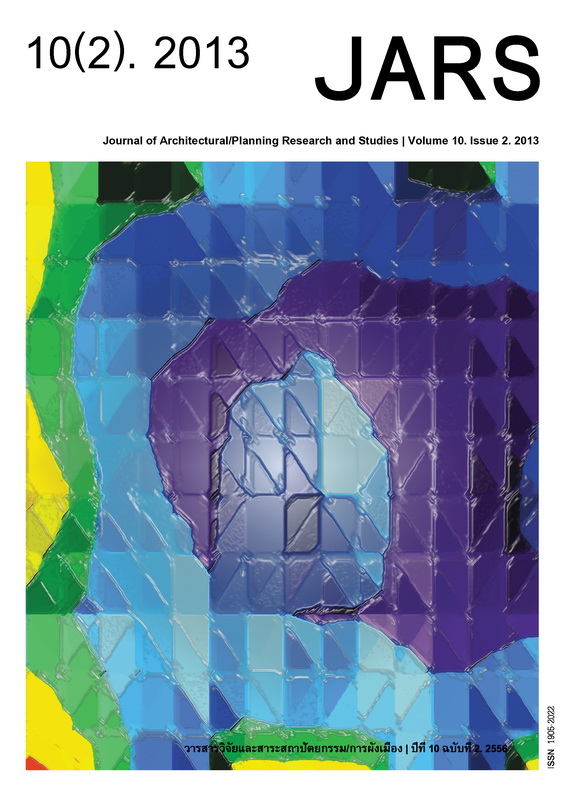Competencies of Property Valuers in Thailand
Main Article Content
Abstract
Downloads
Article Details

This work is licensed under a Creative Commons Attribution-NonCommercial-NoDerivatives 4.0 International License.
All material is licensed under the terms of the Creative Commons Attribution 4.0 International (CC-BY-NC-ND 4.0) License, unless otherwise stated. As such, authors are free to share, copy, and redistribute the material in any medium or format. The authors must give appropriate credit, provide a link to the license, and indicate if changes were made. The authors may do so in any reasonable manner, but not in any way that suggests the licensor endorses you or your use. The authors may not use the material for commercial purposes. If the authors remix, transform, or build upon the material, they may not distribute the modified material, unless permission is obtained from JARS. Final, accepted versions of the paper may be posted on third party repositories, provided appropriate acknowledgement to the original source is clearly noted.
References
Boonrod, K., Kruakrad, P. & Boonyasit, W. (2005). รายงานการวิจัย: ความสัมพันธ์ของการศึกษาต่ออาชีพพนักงานประเมิน [Research report: Relative of education and valuer]. Bangkok, Thailand: Business School Thammasat University.
Boyatzis, R. E. (1982). The competent manager. New York: John Wiley & Sons.
Chokwattana, B. (2010). คนดี VS คนเก่ง [Good man VS intellect man]. Retrieved from March 9, 2013, from http://www.bangkokbiznews.com/home/details/business/ceo_blogs/boonchai_c/20101006/356370/คนดี-vs-คนเก่ง.html
Daramas, S. (2008). ความต้องการผู้ประเมินค่าทรัพย์สิน [Valuer requirement]. Journal of Thai Appraisal Foundation, 7(2), 10-11.
Dechawatanapaisal, D. (2000). Competency-based human resource. Journal of Personnel Management Association of Thailand, 21(4), 11-22.
Jitrprasong, N. (1991). กระบวนการประเมินราคา [Property valuation process]. Bangkok, Thailand: Thammasat University Press.
Kierstead, D. C. (1998). Competencies and KSAO’s. Retrieved from March 9, 2013, from http://www.hrma-agrh.gc.ca
Kirschner, P., Vilsteren, P. V., Hummel, H. & Wigman, M. (1997). The design of a study environment for acquiring academic and professional competence. Studies in Higher Education, 22(2), 151-171.
Kongkasawad, T. (2005). เริ่มต้นอย่างไร...เมื่อจะนำ COMPETENCY มาใช้ในองค์กร [How to implement the competency concept in organization]. Bangkok, Thailand: Technology Promotion Association.
Lampool, P. (2008). ปัญหา-อุปสรรควิชาชีพการประเมินค่า [Trouble of valuer]. Journal of Thai Appraisal Foundation, 7(2), 14.
Likert, R. (1976). New patterns of management. New York: McGraw-Hill.
McLagan, P. A. (1997). Competencies: The next generation. Training & Development, 51(5), 40-47.
Miller, G.H. & Gallagher, K.R. (1997). Residential real estate appraisal. New Jersey: Prentice Hall.
Monthaphan, P. (2009). ศักยภาพผู้ประเมินมูลค่าทรัพย์สินในประเทศไทย [Potential of valuer in Thailand]. Journal of Thai Valuers Association, 33, 3-4.
Office of the Civil Service Commission [OCSC]. (2004). การพัฒนาสมรรถนะการบริหารทรัพยากรบุคคลในราชการพลเรือน ประสบการณ์จากราชการนำร่อง [Experience of competency development for human resource management in civil]. Bangkok, Thailand: Author.
Parry, S. B. (1998). Just what is a competency?. Training, 35(6), 58-64.
Pornchokchai, S. (2008). วงการประเมินค่าทรัพย์สินเวียดนามนำไทยซะแล้ว [Property valuation in Vietnam better than Thailand]. Journal of Thai Appraisal Foundation, 7(1), 16.
Raengsungnoen, K. (2011). การวิเคราะห์ปัจจัยด้วย SPSS และ AMOS เพื่อการวิจัย [Factor analysis for research with SPSS and AMOS]. Bangkok, Thailand: Se-Education.
Rylatt, A. & Lohan, K. (1995). Creating training miracles. Sydney: Prentice Hall. The Securities and Exchange Commission. (2005). มาตรฐานและจรรยาบรรณวิชาชีพการประเมินมูลค่าทรัพย์สินในประเทศไทย. [Property valuation standard practice and ethics in Thailand]. Bangkok, Thailand: Author.
Siljaru, T. (2012). การวิจัยและวิเคราะห์ข้อมูลทางสถิติด้วย SPSS และ AMOS [Statistic research and data analysis with SPSS and AMOS]. Bangkok, Thailand: Business R&D Partnership.
Spencer, L. M. & Spencer, S. M. (1993). Competence at work: Models for superior performance. New York: John Wiley & Sons.
Sungsil, P. (1995). หลักการประเมินราคาทรัพย์สิน [Principal of property valuation]. Bangkok, Thailand: Suthasin Printing.
The Royal Institute of Chartered Surveyors [RICS]. (2012). Property valuation pathway. Retrieved April 20, 2013, from http://www.rics.org/Global/PER%20pathway%20guides/PER_Selecting_Competencies_guide_Valuation_130612_dwl.pdf
Thai Valuers Association. (2010). กฎหมายควบคุมนักประเมิน ถึงเวลาแล้วหรือยัง? [Is the time for valuers control law?]. Journal of Thai Valuers Association, 35, 1-4.
Whipple, R. T. M. (1995). Property valuation and analysis. Australia: Law Book.
Wimolsiri, P. (2011). รวมสมองมองอนาคตอุดมศึกษาไทย [Future of higher education]. Retrieved April 20, 2013, from http://www.komchadluek.net/


